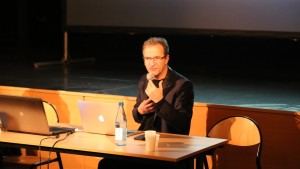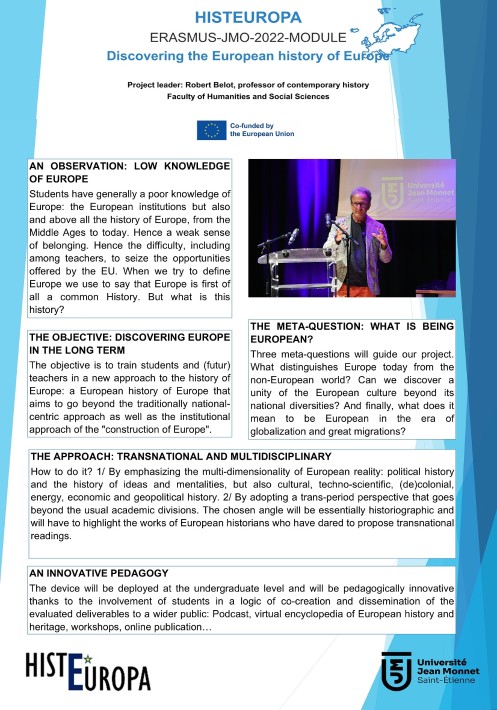Histeuropa
ERASMUS-JMO-2022-MODULE
DISCOVERING THE EUROPEAN HISTORY OF EUROPE
Project leader: Robert Belot, professor of contemporary history
Faculty of Humanities and Social Sciences
AN OBSERVATION: LOW KNOWLEDGE OF EUROPE
Students have generally a poor knowledge of Europe: the European institutions but also and above all the history of Europe, from the Middle Ages to today. Hence a weak sense of belonging. Hence the difficulty, including among teachers, to seize the opportunities offered by the EU. When we try to define Europe we use to say that Europe is first of all a common History. But what is this history?
THE OBJECTIVE: DISCOVERING EUROPE IN THE LONG TERM
The objective is to train students and (futur) teachers in a new approach to the history of Europe: a European history of Europe that aims to go beyond the traditionally national-centric approach as well as the institutional approach of the "construction of Europe".
THE META-QUESTION: WHAT IS BEING EUROPEAN?
Three meta-questions will guide our project. What distinguishes Europe today from the non-European world? Can we discover a unity of the European culture beyond its national diversities? And finally, what does it mean to be European in the era of globalization and great migrations?
THE APPROACH: TRANSNATIONAL AND MULTIDISCIPLINARY
How to do it? 1/ By emphasizing the multi-dimensionality of European reality: political history and the history of ideas and mentalities, but also cultural, techno-scientific, (de)colonial, energy, economic and geopolitical history. 2/ By adopting a trans-period perspective that goes beyond the usual academic divisions. The chosen angle will be essentially historiographic and will have to highlight the works of European historians who have dared to propose transnational readings.
AN INNOVATIVE PEDAGOGY
The device will be deployed at the undergraduate level and will be pedagogically innovative thanks to the involvement of students in a logic of co-creation and dissemination of the evaluated deliverables to a wider public: Youtube channel, virtual encyclopedia of European history and heritage, workshops, online publication...
 Robert BELOT est professeur d’histoire contemporaine à l’université de Lyon-Saint-Etienne où il a dirigé le Département des Patrimoines culturels. Coordinateur académique de l’Erasmus Mundus Joint Master Degree DYCLAM+. Il a été titulaire de la Chaire européenne Jean Monnet EUPOPA de 2018 à 2022.
Robert BELOT est professeur d’histoire contemporaine à l’université de Lyon-Saint-Etienne où il a dirigé le Département des Patrimoines culturels. Coordinateur académique de l’Erasmus Mundus Joint Master Degree DYCLAM+. Il a été titulaire de la Chaire européenne Jean Monnet EUPOPA de 2018 à 2022.
Sa recherche porte sur l’histoire de l’Europe (XIXe-XXe siècles) et la construction socio-politique de la mémoire et du patrimoine. Il a consacré son habilitation à diriger les recherches (Sciences Po Paris) à l’itinéraire politique d’Henri Frenay, qui a été publiée aux éditions du Seuil (« L’Univers Historique ») sous le titre : Henri Frenay, de la Résistance à l’Europe.
Il a coordonné le Partenariat Stratégique Européen (ERASMUS+) Projet Patrimoine Européen pour un Avenir Culturel Ensemble (ProPeace) impliquant 9 pays, de 2017 à 2019.
Dernières publications :
Vladimir Poutine ou la falsification de l'histoire comme arme de guerre, Fondation Jean Monnet pour l'Europe, Lausanne, « Debates and Documents Collection », 2024
« La Resistenza francese e la questione europea », in L’unità europea obiettivo comune della Resistanza al nazifascismo (a cura di Antonella Braga, Fulvio Cambotto), Bologna, Il Mulino, 2024, p. 55-78
« Vom patriotischen Reflex zum europäischen Bewusstsein. Der französische Widerstand und die geopolitische Lage »1945 Wir kämpfen für ein Europa des Friedens. Europapläne im deutschen und europäischen Widerstand, 1939-1945, Berlin, Lukas Verlag, 2024, p. 123-148
« Les enjeux organisationnels et politiques du renseignement dans la Résistance » (The organisational and political challenges of intelligence in the Résistance), Renseignement et espionnage pendant la Seconde Guerre mondiale (Eric Denécé ed.), Paris, Ellipses, 2024, p. 259-287
Deutschland in den Europaprojekten der Résistance, Baden Baden, NOMOS, 2023
Henri Frenay au général de Gaulle. Lettres et rapports sur la Résistance et l’Europe (1942-1953), Lyon, Presse Fédéraliste éditions, 2023.
“Berty Albrecht and her Role in the French Resistance: An Exceptional Case?”, Elma Hasimbegovic, Nicolas Moll and Ivo Pejakovic, eds., Wer ist Walter? International Perspectives on Resistance in Europe during World War II, Sarajevo, History Museum of Bosnia and Herzegovina, 2024, p. 165-185. “Wer ist Walter? Resistance against Nazism in Europe”, First conference, Berlin, Marc Bloch Center, 14th to 16th of May 2023
« L’agir patrimonial comme processus de résilience: un mythe et ses limites » (“Heritage action as a process of resilience: a myth and its limits) Heritage: Transforming landscapes through the arts and technology (ed. Luiz Oosterbeek), ARKEOS, vol. 57, 2024, p.17-52. Proceddings of the APHELEIA seminar, UNESCO-IPT Chair in Humanities and Cultural Integrated Landscape Management, Maçao, 2022, Portugal
Patrimoine, Péril, Résilience, Paris, Maisonneuve&Larose/Hémisphères, (co-direction Philippe Martin), 2022
La mémoire anti-allemande en France. Henri Frenay et l’affaire Speidel (1957), Lyon, Presse Fédéraliste éditions, Collection « Textes fédéralistes », 2022
The rebirth of Europe after the war. Hopes, divisions and failure among the French Resistance, Lausanne, Fondation Jean Monnet pour l’Europe, coll. Les Cahiers Rouges, 2022 https://jean-monnet.ch/wp-content/uploads/2022/09/22-10-rebirth-of-europe-r--belot-cr-n-219.pdf
Resistenza e la rinascita dell'idea europea (1942-1947), collana “Fonti e studi sul federalismo e sull’integrazionne europea”, Bologna, Il Mulino, 2022, 282p. https://www.mulino.it/isbn/9788815298171
Visions of Europe in the Resistance. Figures, Projects, Networks, Ideals (Robert Belot and Daniela Preda eds.), Bruxelles, M.I.E. Peter Lang, Euroclio vol. 112, 2022, 560p.



 Université Jean Monnet
Université Jean Monnet